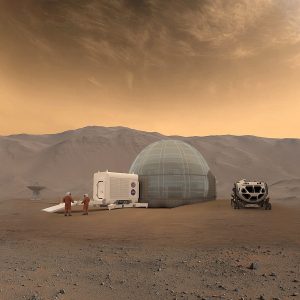Image from Wikipedia
Welcome back to Aleiah who posted for the Turret while she was a student in Communication in Engineering (CCOM 206). Here is a post she wrote with her fellow student, Kevin Xie, for a class assignment for Engineering Professional Practice (FACC 400).
The Ethics of Colonization on Mars
Humanity is on the verge of technological advancement which will make possible the colonization of Mars, the red planet. According to SpaceX the first human is planned to land on Mars by the year 20241. However, this calls into question: Should humanity colonize Mars?
The colonization of Mars is a complex issue with many underlying aspects. There are also many technical challenges such as, overcoming cosmic radiation, bone demineralization and the psychological stress of a journey to Mars. For Mars to be habitable by humans, it must first be terraformed. Terraforming is a process in which the environment of a planet is modified to emulate the earth. It involves the modification of the atmosphere, topography, temperature and ecology. Doing this will help scientists on Earth understand Earth’s own environment as well as facilitate human life on mars. Any technological advancements made will help all of humanity. An example of this is climate change on Earth. Understanding how to control the temperature of a planet can help solve climate change on Earth.
Whether or not the Mars colonization project is a success, humanity can benefit from this project as the technology required to successfully colonize Mars can be useful on Earth as well. For example, here are three industries that would be greatly advanced thanks to the Mars project, to the benefit of humans on Earth:
- Agriculture:
The World Bank reported in 20152 that approximately 11% of Earth is arable, meaning capable of being ploughed and used for crops. As human population grows and food security becomes a greater issue, the agricultural industry would benefit from technology that allowed them to farm on unforgiving land. The Mars project faces this exact design problem as humans would need to start growing their own food on Mars in order to successfully colonize there.
- Medical:
Astronauts face a number of health issues in space, such as loss of bone density and muscular atrophy due to the lower gravity. In particular, Mars only has 38% of Earth’s gravity. Under prolonged circumstances, astronauts could find themselves facing skeletal damage. Although the circumstances are unique to the astronauts, these health concerns are not. Osteoporosis is a common public health problem whose patients tend to neglect their medication as they don’t believe in the effectiveness of the treatment. Solving this problem for astronauts will also help these patients.
- Nuclear Power:
Mars offers very little radiation protection and shielding compared to Earth, due to having no magnetosphere and a very thin atmosphere. Whereas humans on Earth are naturally protected from solar radiation and galactic cosmic rays, as Earth explores more sources of energy including nuclear power, it will soon become increasingly important to create technology that would protect humans from radiation.
Additionally, it is important to think of the colonization of Mars not as a transfer, but an expansion. Creating a colony on Mars does not mean that the earth will be abandoned. It can be compared to the first European settlers arriving in America. America was simply an expansion. In order for humanity to continue to progress, Mars must be colonized.
The colonization of Mars is also a stepping stone for humans to move beyond the solar system. The knowledge gained from colonizing mars will not only pave the way to going to other planets, but also building permanently habitable space stations in which humans can live.
Citations
Arable land (% of land area). (n.d.). Retrieved November 09, 2018, from https://data.worldbank.org/indicator/AG.LND.ARBL.ZS?end=2015&start=2015&view=bar
This is how SpaceX will get humans to Mars by 2024 | CBC News. (2017, September 29). Retrieved November 09, 2018, from https://www.cbc.ca/news/technology/spacex-mars-rocket-elon-musk-1.4312878

